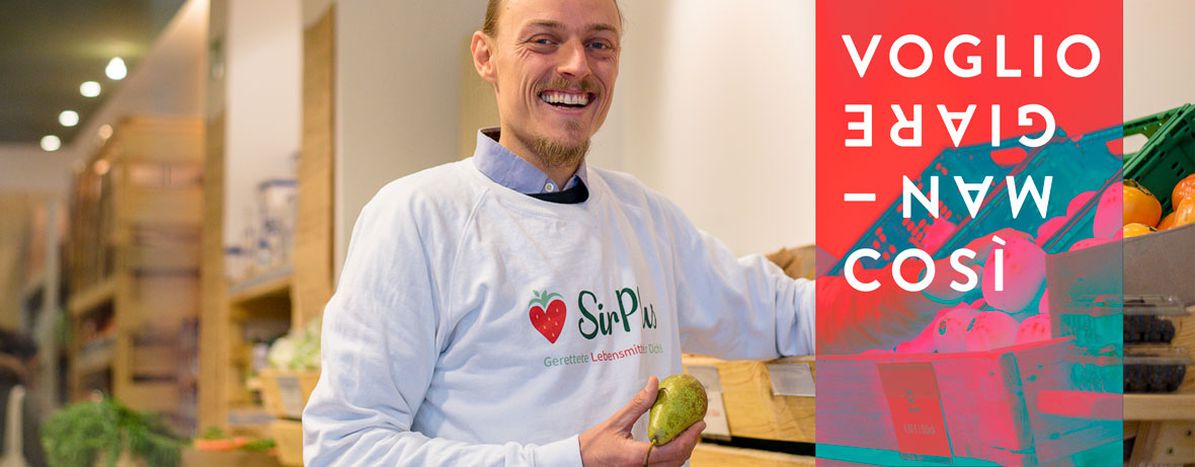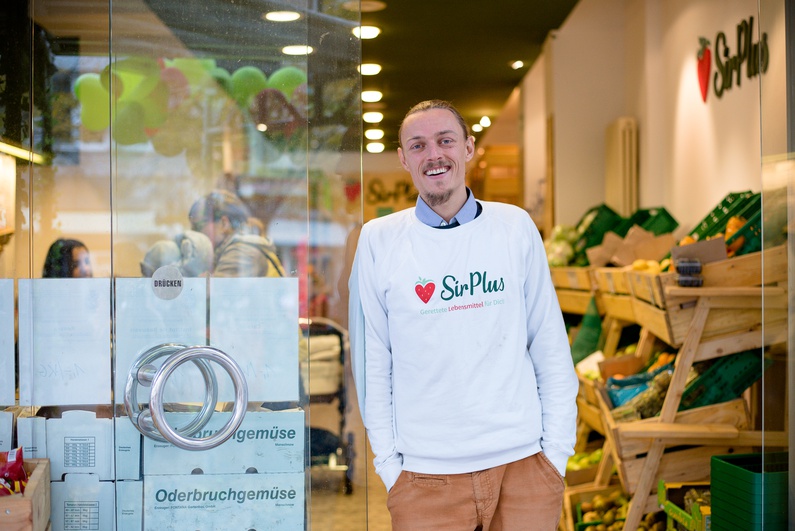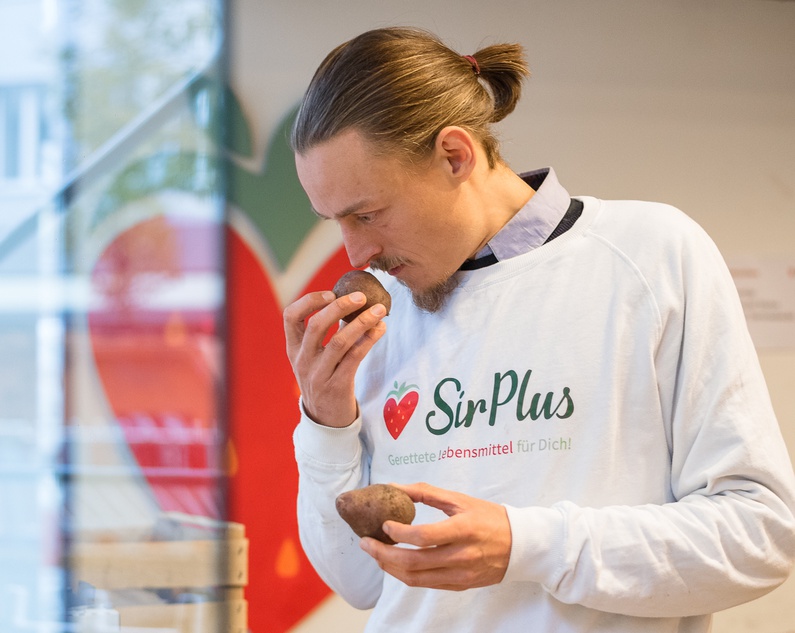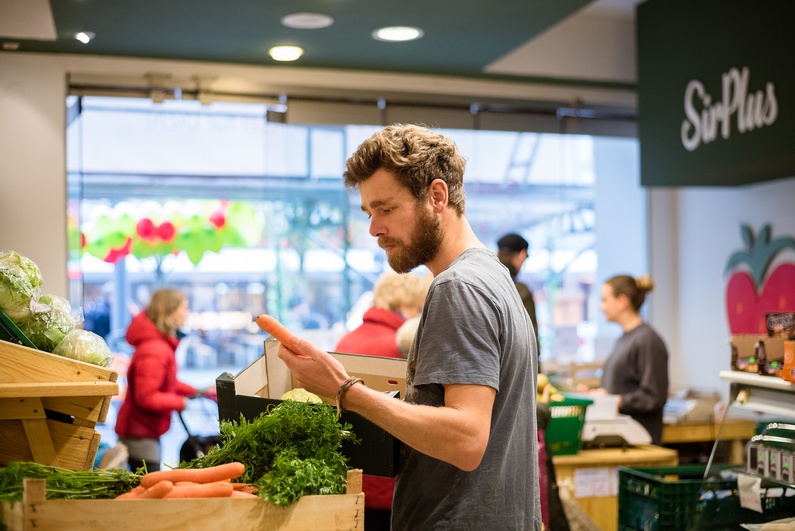
Food waste: You’re gonna love eating expired food
Published on
Translation by:
 Margaret Morrison
Margaret Morrison
He spent five years living without money and co-founded a food exchange platform. In the war against food waste, Raphael Fellmer is no rookie. So running the first ever supermarket dedicated to selling waste food products was an obvious move on his part. And he’s planning on making this a trend beyond Berlin, his hometown.
We arranged to meet at the supermarket. At 59 Wilmerdorferstraße, to be precise. The shop is hard to miss; there is a facade that is under construction and part of the scaffolding is covered by a white banner with a logo on it. We have arrived early and given the mid-November weather in Berlin, we can’t stay outside for very long. Once inside the warmth of the shop, we see piles of fruit and vegetables to our right. They look ‘normal’.
Further down on the shelves we see popcorn, organic compotes, crisps of all kinds and gluten-free biscuits. The shop is small; smaller than we had imagined. At the moment, there are only two aisles dedicated to the products that Raphael Fellmer’s team salvages. SirPlus is not your typical supermarket. The shop, which looks just like any local grocery store, is entirely dedicated to selling food products that would have gone to waste. “This is just the beginning,” Raphael Fellmer says as he approaches us. He hurriedly takes off his bulky winter jacket, revealing his white SirPlus polo shirt with a heart-shaped strawberry logo. The logo suits him.
Wasting is cheating
SirPlus opened just three months ago (on September 8th last year) on a very busy pedestrian street in Berlin, in the heart of the upmarket Charlottenburg district. It’s an unexpected address for this kind of project. “The owner was excited about our idea and gave us a good discount, otherwise we would never have been able to pay the rent!” Fellmer explains, his eyes sparkling with pride. With good reason: in terms of visibility and accessibility, the location is perfect. But above all, it reflects one of the company’s core values: to show that the consumption of products being thrown away despite being edible is not just for people in need. So if going vegan and gluten-free are today’s food trends, is ‘expired eating’ next?
 Raphael Fellmer, 34-year-old Berliner and author of Glücklich one Geld! (“Happy without money” in German, ed.), is known worldwide for having spent five years without access to money. His goal at the time? To show that our patterns of consumption are no longer viable and to shine a light on food waste. In 2012, he co-founded Foodsharing, a platform enabling individuals and retailers to list food online that they are about to waste so people can collect it for free. Say you’re going away on holiday, instead of throwing away the contents of your fridge, you donate it via Foodsharing. Over the course of five years, 12 million kilos of food have been saved from the bin thanks to more than 35,000 ‘Foodsavers’. A success, but a niche success nonetheless. That’s why Fellmer has chosen to take a step back and work with Martin Schott, an engineer, and Alexander Piutti, an entrepreneur, to create SirPlus.
Raphael Fellmer, 34-year-old Berliner and author of Glücklich one Geld! (“Happy without money” in German, ed.), is known worldwide for having spent five years without access to money. His goal at the time? To show that our patterns of consumption are no longer viable and to shine a light on food waste. In 2012, he co-founded Foodsharing, a platform enabling individuals and retailers to list food online that they are about to waste so people can collect it for free. Say you’re going away on holiday, instead of throwing away the contents of your fridge, you donate it via Foodsharing. Over the course of five years, 12 million kilos of food have been saved from the bin thanks to more than 35,000 ‘Foodsavers’. A success, but a niche success nonetheless. That’s why Fellmer has chosen to take a step back and work with Martin Schott, an engineer, and Alexander Piutti, an entrepreneur, to create SirPlus.
Fellmer knows the statistics on food waste by heart. He repeats them religiously, like a mantra, at the beginning of every interview: “In Europe, 50% of our food goes to waste,” “Every year, we throw away 1.3 billion tonnes of food globally,” “In Germany, 20 million tonnes of food are thrown away each year, which is one lorry load every minute.” He’s an old hand at interviews, and he constantly has a huge smile on his face. His enthusiasm is infectious. He listens to our questions and still manages to greet each person that walks into the shop. For him, it’s not about problems, it’s about solutions. It’s not about businesses, it’s about human beings. His words are simple and effective, and it’s hard not to be affected by his ideas. He is well aware of the fact that, in order to fight food waste, everyone has to be on board. So as the years have gone by, his campaign has become a real crusade.
But how can you stay so motivated with 1.3 billion tonnes of food being wasted each year? “We keep our eyes open, we look the problem in the face, and we go on the offensive,” he replies. SirPlus is fighting on all fronts: home delivery to consumers, launching a supermarket chain in Germany and then across Europe (aiming for 35 shops by 2022), developing a digital platform for retailers… From individuals to wholesalers to farmers, soon no one will be able to claim they can’t do anything to combat food waste.
Starting a new trend
As its name suggests, SirPlus has two main objectives: reducing food waste by salvaging food directly from supermarkets and farmers, and raising awareness by starting a new trend, like making a virtue of ‘ugly’ or expired vegetables. So far so good: they have had quite a few converts. On the supermarket’s Wall of Fame, you can find logos of companies like BioCompany, Metro or Real. Fellmer points out three big crates of potatoes at the entrance. “They come directly from a farmer.”
 All products in the store are sold up to 70% cheaper than regular market price. In addition, 20% of the food salvaged by SirPlus is redistributed free of charge to charities. But is selling products after their ‘best before’ date legal? “Of course!" Raphael answers, obviously used to the question, “In most countries in the European Union, it is perfectly legal.” So why do supermarkets prefer to throw tonnes of food in the bin every year? The 30-year-old activist counts off the reasons on his fingers. First: legal responsibility. Once the product passes its best before date, the shop that sells the product becomes responsible. Second: the shop’s image. While it is legal to sell expired products, it is mandatory to communicate that information to customers as well as to monitor the product quality. So that’s where SirPlus comes in. Products coming into the shop’s inventory are systematically checked and tested before being put on the shelves, and a clearly visible sign at the entrance of the shop displays the terms and conditions. At the same time, the marketing team does everything possible to change the bad reputation that these “unusual” products have.
All products in the store are sold up to 70% cheaper than regular market price. In addition, 20% of the food salvaged by SirPlus is redistributed free of charge to charities. But is selling products after their ‘best before’ date legal? “Of course!" Raphael answers, obviously used to the question, “In most countries in the European Union, it is perfectly legal.” So why do supermarkets prefer to throw tonnes of food in the bin every year? The 30-year-old activist counts off the reasons on his fingers. First: legal responsibility. Once the product passes its best before date, the shop that sells the product becomes responsible. Second: the shop’s image. While it is legal to sell expired products, it is mandatory to communicate that information to customers as well as to monitor the product quality. So that’s where SirPlus comes in. Products coming into the shop’s inventory are systematically checked and tested before being put on the shelves, and a clearly visible sign at the entrance of the shop displays the terms and conditions. At the same time, the marketing team does everything possible to change the bad reputation that these “unusual” products have.
Does it work? "Yes, pretty well! Every day, we receive very positive feedback from both retailers and individuals. They say: 'Finally, you've done it!’” Great, but convincing large food chains to change their procedures is probably not so easy. “With Metro for example, the negotiations lasted 10 months,” Raphael continues, “now we collect food six days out of seven in two of their Berlin stores, and they're very happy with this partnership. It saves money, it's good for their image, and their employees are happy.”
But they still need individuals to support the initiative, because, given the size of the shop, you still can’t find everything at SirPlus. "It's true, but you have to start somewhere. We can't always wait for everything to be perfect." But how do you convince them to take the plunge? "First of all, you should know that we are listing new products every day. Within a year, there will definitely be 500 different ones. Dairy products, meat, cosmetics and household products are on the way. Next, we’ve set up a box delivery system in Berlin and this will soon be extended all across Germany so that everyone can enjoy it.” Eventually, these "Retterboxes" will be available in vegetarian, vegan or gluten-free versions, and delivered throughout Europe.
"People don't know what all this means"
Talking to everyone, giving everyone the opportunity to change things is the goal of SirPlus. It’s another way of saying that we are all responsible. "The problem is that fruit and vegetables have to meet standards. Cucumbers, for example, have to be straight. Consumers have internalised these standards. But who can blame them? No one can quote the statistics on food waste. People suspect that they exist, but they do not know exactly what it means." Fellmer mentions schools. If only children were taught at an early age that nature does not produce perfectly straight carrots and perfectly round tomatoes, that behind this crate of apples there are men and women, labour and sweat. "When you go to the bakery and the baker has run out of your favourite baguette, don't rush off to find it somewhere else. On the contrary, take the opportunity to choose another kind of bread,” the activist encourages us. Because this is one of the causes of food waste: overproduction to meet our need to have everything available, all the time. "At home, why the obsession with having a full fridge? Wouldn't it be nice not to wonder what I want to eat tonight, but what should I eat tonight? What will end up in the bin tomorrow? This leftover rice? This yogurt?”
 As well as marketing to individuals, opening supermarkets, the domestic box deliveries, and the collection of food from the big food groups and farmers (known as B2C, business to consumers), SirPlus tackles B2B (business to business) and the very foundations of the system. "We are creating a digital platform to connect the different stakeholders. Imagine that a farmer finds himself with 200 kilos of potatoes. He can now list it on the application. A crisp maker will be able to see it, collect the potatoes, choose to tell his customers if he wishes, to ensure that these 200 kilos do not end up in the bin.” While linking professionals to each other will generate revenue for SirPlus, the company will offer this service free of charge to NGOs.
As well as marketing to individuals, opening supermarkets, the domestic box deliveries, and the collection of food from the big food groups and farmers (known as B2C, business to consumers), SirPlus tackles B2B (business to business) and the very foundations of the system. "We are creating a digital platform to connect the different stakeholders. Imagine that a farmer finds himself with 200 kilos of potatoes. He can now list it on the application. A crisp maker will be able to see it, collect the potatoes, choose to tell his customers if he wishes, to ensure that these 200 kilos do not end up in the bin.” While linking professionals to each other will generate revenue for SirPlus, the company will offer this service free of charge to NGOs.
With strong support from its crowdfunding campaigns, SirPlus also benefits from European support via the ClimateKIC program, which specialises in sustainable solutions. But as Fellmer acknowledges, SirPlus would need the intervention of new business angels and a few hundred thousand Euros extra to operate on a large scale. So should we worry about the future? Are SirPlus' European dreams destined to remain confined to Berlin, or, at best, across Germany?
In the Berlin shop, it's getting crowded. Footfall has not dropped since the opening, three months ago, and this Monday afternoon, SirPlus is full. Before leaving, we take a last look at Fellmer and his Cheshire cat smile. His staff are moving pallets loaded with vegetables. His crusade against food waste seems to be rolling out without obstacle, and it could well be that in France, Belgium, Italy or Spain, we'll soon be raving about the SirPlus method. Anyway, how could you resist heart shaped strawberries?
---
Voglio Mangiare Così is a series of portraits that show what's being eaten by young Europeans today. A little out of whack, a little political and a little weird, these eight portraits embody what it means to follow an alternative diet.
Translated from Gaspillage alimentaire : vous allez aimer manger périmé


